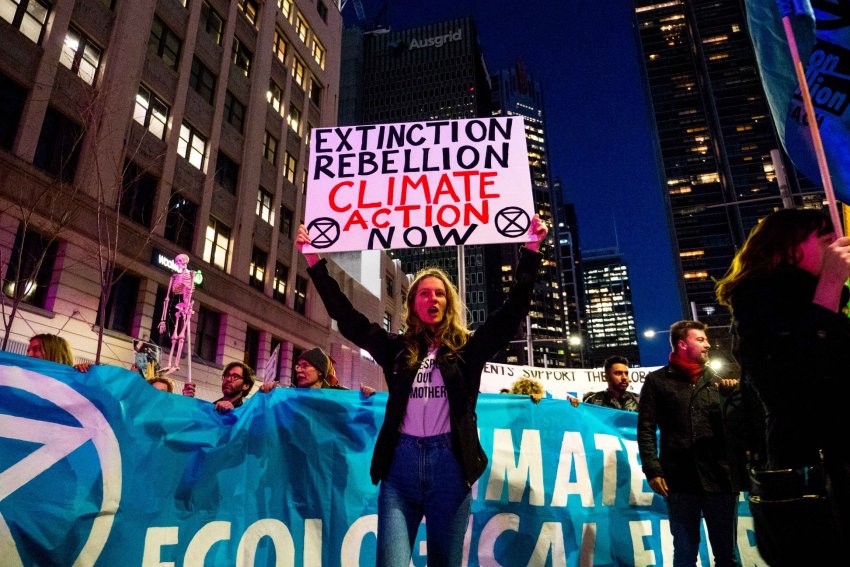
Young people around the world are taking seriously the warning from the Intergovernmental Panel on Climate Change that genuine action is urgently needed if we are to prevent catastrophic climate change.
That is why they have initiated a global Climate Strike on September 20, just days out from an emergency United Nations climate summit, to pressure governments into action.
With raging fires in the Arctic and the Amazon, the hottest July temperatures on record and new reports each day confirming we face an escalating climate crisis, there could not be a more compelling case to build the Climate Strike.
In March, about 150,000 school students and supporters across Australia took part in the School Strike 4 Climate, and a further 1.5 million participated worldwide.
At the time, many unions responded with statements of support.
But this time it is not a school strike — it is a climate strike. As the school strikers put it, “to act at the scale that this crisis demands, it’s going to take all of us”.
Support for the September 20 Climate Strike has been building in the trade union movement — one of the critical sectors needed to help make this strike huge.
National unions such as the National Tertiary Education Union, the Maritime Union of Australia (MUA) and the Australian Services Union (ASU) are among those that have pledged explicit support.
A July 25 ASU national executive statement said the union “is proud to support the school strikers’ Global #ClimateStrike on September 20 and the young leaders who are demanding real and immediate action on climate change.”
“That’s why the ASU is calling on members and workers to support the school strikers … by taking a day of leave to attend a #ClimateStrike rally on September 20, organising a workplace solidarity selfie, or passing a workplace resolution in support of these young activists.”
Union state branches, committees and delegates’ meetings have also passed motions of support. This includes the UnionsACT Women's Committee, a Community and Public Sector Union Bureau of Meteorology delegates’ meeting and the Australian Education Union Victorian branch council.
Unions WA, which unites unions from across Western Australia, endorsed the climate strike on August 20.
The MUA Sydney branch passed a motion on June 25 stating: “We will build for the widest possible stoppage of work to join demonstrations on September 20.”
Rank and file activists at the Queensland Teachers Union state conference in July successfully moved a motion of support and the Finance Sector Union, Local Enterprise Council, Westpac, NSW/ACT voted to encourage participation in the strike on July 31.
Solidarity has gone both ways. The school strikers have made efforts to express support for union struggles and have ensured that protection of jobs and a just transition is part of the message of the Climate Strike.
School Strike 4 Climate (SS4C) activists in Sydney offered support to MUA members in their dispute with DP World. The company had threatened to sack 200 workers and, according to MUA activist Penny McCall Howard, “before the MUA had sent out any request for solidarity, the climate strikers who we'd been working with rang up and said: 'what can we do for solidarity?’
“The very next day the MUA had a letter from them and the School Strike 4 Climate put out a solidarity statement on their Facebook page.”
Climate strikers followed this up with a visit to a DP World picket line in Melbourne.
SS4C has also put out a statement expressing opposition to the Coalition government’s Ensuring Integrity Bill, which is a naked attack on the union movement.
The statement notes: “Workers deserve more rights, not fewer. Yet this Bill would undermine unions’ ability to defend workers’ rights, making the economic and energy transformations ahead of us even more challenging than they already are.
“School strikers stand in solidarity with the union movement in its work to build a more equitable society and fight the unjust systems that are hurting people and our planet.
“The only way we stand up to the 1% holding us all back is by working together and showing up for one another when it matters most.”
SS4C has produced a Worker Participation Guide to encourage support for the September 20 Climate Strike. The guide includes a number of ways that workers can support or participate in the strike, such as taking leave, having a longer than usual lunch break, organising a workplace event and passing motions of support.
It is critical that unions support the Climate Strike and make it as big as possible. It is not too late to organise workplace participation and a message of support.
[Please send news of any motions passed or actions at your workplace to Green Left Weekly.]